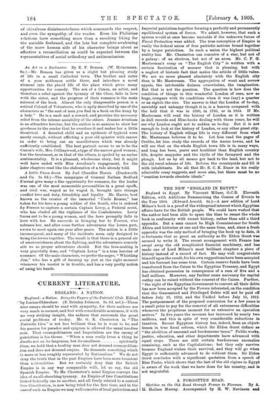England in Egypt. By Viscount Milner, G.C.B. Eleventh Edition, with
Additions Summarising the Course of Events to the Year 1904. (Edward Arnold. 6s.)-1 new edition of Lord Milner's book is a proof of the widespread interest which Egyptian affairs have for the British people. We could have wished that the author had been able to spare the time to recast the whole book in conformity with recent history, rather than add a third appendix. But a man cannot be High Commissioner for South Africa and historian at one and the same time, and, since a fresh appendix was the only method of bringing the book up to date, it is fortunate that so great an authority as Sir Eldon Gorst was secured to write it. The recent arrangement with France has swept away the old complicated financial machinery, and has made one of Lord Milner's most brilliant chapters a piece of history instead of a record of fact. He may well congratulate himself upon the result, for his own suggestions have been accepted and his forecast has come true. Certain reserve funds have been transferred from the Caisse to the Egyptian Treasury, and Egypt has obtained possession in consequence of a sum of five and a half millions. Moreover, any further sums necessary for capital outlay can be raised without the consent of the Caisse. Further, "the right of the Egyptian Government to convert all their debts has now been accepted by the Powers interested, on the condition that the Guaranteed and Privileged Debts will not be paid off before July 15, 1910, and the Unified before July 15, 1912. The postponement of the proposed conversion for a few years is a small price to pay for the removal of all extraneous difficulties whenever the propitious moment for so extensive an operation arrives." In five years the revenue has increased by nearly two millions, and this in spite of very considerable reductions in taxation. Recent Egyptian history has, indeed, been an object- lesson in true fiscal reform, which Sir Eldon Gorst defines as "the abolition of unsound and burdensome taxes." Public works, justice, education, and other departments have advanced with equal steps. There are still certain burdensome anomalies remaining, such as the Capitulations ; but they only survive because England wishes their survival, and they will go when Egypt is sufficiently advanced to do without them. Sir Eldon Gorst concludes with a significant quotation from a speech of Riaz Pasha, which shows that the last of the old regime in Egypt is aware of the work that we have done for his country, and is not ungrateful.










































 Previous page
Previous page